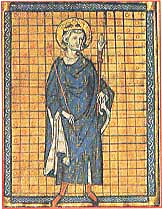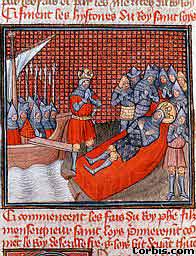Readings:
Wisdom 7:1-6
Psalm 21:1-7
Colossians 2:6-10
Mark 2:13-17Preface of Baptism
[Common of a Saint]
[For Vocation in Daily Work]
[For the Nation]
PRAYER (traditional language)
O God, who didst call thy servant Louis of France to an earthly throne that he might advance thy heavenly kingdom, and didst give him zeal for thy church and love for thy people: Mercifully grant that we who commemorate him this day may be fruitful in good works, and attain to the glorious crown of thy saints; through Jesus Christ our Lord, who liveth and reigneth with thee and the Holy Spirit, one God, for ever and ever. Amen.
PRAYER (contemporary language)
O God, you called your servant Louis of
France to an earthly throne that he might advance your heavenly kingdom,
and gave him zeal for your church and love for your people: Mercifully
grant that we who commemorate him this day may be fruitful in good works,
and attain to the glorious crown of your saints; through Jesus Christ our
Lord, who lives and reigns with you and the Holy Spirit, one God, for ever
and ever. Amen.
Lessons revised at General Convention 2024
Return to Lectionary Home Page
Webmaster: Charles Wohlers
Last updated: 10 July 2024
LOUIS IX
KING OF FRANCE (25 AUGUST 1270)
 Louis
was born in 1214 and became King of France when twelve years old. His mother,
the half-English Blanche of Castile, was regent during his minority, and
an influence while she lived. In 1234 he married Margaret of Provence, sister
of Eleanor the wife of Henry III of England (no, not the couple from A
Lion in Winter--that was Henry II and Eleanor of Aquitaine: this is
two generations later).
Louis
was born in 1214 and became King of France when twelve years old. His mother,
the half-English Blanche of Castile, was regent during his minority, and
an influence while she lived. In 1234 he married Margaret of Provence, sister
of Eleanor the wife of Henry III of England (no, not the couple from A
Lion in Winter--that was Henry II and Eleanor of Aquitaine: this is
two generations later).
Louis worked for the political unification of France, yielding Limoge, Cahors, and Perigeux to Henry in exchange for Henry's renunciation of all claims to Normandy, Anjou, Maine, Touraine, and Poitou (Treaty of Paris, 1259). He yielded French claims to Rousillon and Barcelona in exchange for the yielding of Spanish claims to Provence and Languedoc (Treaty of Corbeil, 1258). He largely eliminated the feuding and wars among French nobles and vassals that had ravaged France before his time. He protected vassals from oppression, and required their lords to fulfill their obligations. He reformed the system of taxation. He reformed the courts, so that every man in France, regardless of his station, had a far better chance of receiving justice than had previously been the case. He promoted the writing down of the law, so that it was clear what the laws were, and made major strides toward eliminating trial by combat in favor of trial by jury. (Trial by combat decided the guilt or innocence of the accused by a combat between the accused and the accuser, either personally or by proxy, with God being called on to uphold the right. Trial by ordeal required the accused to prove his innocence by, for example, walking across a bed of hot coals. Both were hold-overs from pre-Christian Frankish Law, and were vigorously denounced by many clergy, but took a long time to die out.) His reputation for integrity was such that foreign monarchs regularly asked him to arbitrate their disputes.
He founded a hospital for the poor, sick, and blind, known as the Quinze-Vingts (the Fifteen Score, originally for 300 inmates). His reign coincided with the great era of the building of Gothic cathedrals in France. Robert de Sorbon, the founder of the Sorbonne (University of Paris) was his confessor and his personal friend, and Thomas Aquinas was a frequent guest at his table. (Once, it is said, Thomas dropped out of the conversation, lost in thought, and then suddenly struck the table with his fist and exclaimed, "That is a decisive argument against the Manichees!" Louis at once called for writing materials, so that Thomas could record the argument before he had a chance to forget it.)
 He
fought in two Crusades, both of which were total failures. In 1248 he
led an army to the island of Cyprus, and was there joined by 200 English
knights. In 1249 they proceeded to Egypt and took the city of Damietta,
but discipline broke down and Louis was unable to keep the soldiers from
looting. Disease ravaged the camp, and in 1250 the army suffered a disastrous
defeat at Mansurah and Louis himself was taken prisoner. His Arab captors
were quick to recognize in him a mixture of military valor and personal
holiness, and were accustomed to kneel when speaking to him. He and his
handful of surviving companions were released on the surrender of Damietta
and the payment of a large ransom. He sailed to Palestine, visited the
few Holy Places that were accessible, and returned to France in 1254.
In 1270 he joined another crusade, which landed in Tunis, where he immediately
caught typhoid fever and died on 25 August. His biography, by a friend
and comrade in arms, the Sieur Jean de Joinville, is available in English
in Chronicles
of the Crusades, Penguin Paperbacks. (Also available in an older edition from Geeogle Books)
He
fought in two Crusades, both of which were total failures. In 1248 he
led an army to the island of Cyprus, and was there joined by 200 English
knights. In 1249 they proceeded to Egypt and took the city of Damietta,
but discipline broke down and Louis was unable to keep the soldiers from
looting. Disease ravaged the camp, and in 1250 the army suffered a disastrous
defeat at Mansurah and Louis himself was taken prisoner. His Arab captors
were quick to recognize in him a mixture of military valor and personal
holiness, and were accustomed to kneel when speaking to him. He and his
handful of surviving companions were released on the surrender of Damietta
and the payment of a large ransom. He sailed to Palestine, visited the
few Holy Places that were accessible, and returned to France in 1254.
In 1270 he joined another crusade, which landed in Tunis, where he immediately
caught typhoid fever and died on 25 August. His biography, by a friend
and comrade in arms, the Sieur Jean de Joinville, is available in English
in Chronicles
of the Crusades, Penguin Paperbacks. (Also available in an older edition from Geeogle Books)
by James Kiefer